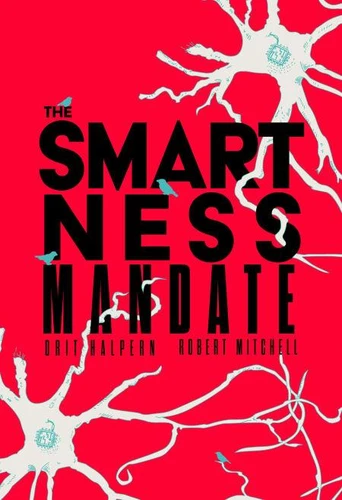The Smartness Mandate
Par : ,Formats :
Disponible dans votre compte client Decitre ou Furet du Nord dès validation de votre commande. Le format ePub protégé est :
- Compatible avec une lecture sur My Vivlio (smartphone, tablette, ordinateur)
- Compatible avec une lecture sur liseuses Vivlio
- Pour les liseuses autres que Vivlio, vous devez utiliser le logiciel Adobe Digital Edition. Non compatible avec la lecture sur les liseuses Kindle, Remarkable et Sony
- Non compatible avec un achat hors France métropolitaine
 , qui est-ce ?
, qui est-ce ?Notre partenaire de plateforme de lecture numérique où vous retrouverez l'ensemble de vos ebooks gratuitement
Pour en savoir plus sur nos ebooks, consultez notre aide en ligne ici
- Nombre de pages336
- FormatePub
- ISBN978-0-262-37194-0
- EAN9780262371940
- Date de parution10/01/2023
- Protection num.Adobe DRM
- Taille41 Mo
- Infos supplémentairesepub
- ÉditeurThe MIT Press
Résumé
Over the last half century, "smartness"-the drive for ubiquitous computing-has become a mandate: a new mode of managing and governing politics, economics, and the environment. Smart phones. Smart cars. Smart homes. Smart cities. The imperative to make our world ever smarter in the face of increasingly complex challenges raises several questions: What is this "smartness mandate"? How has it emerged, and what does it say about our evolving way of understanding-and managing-reality? How have we come to see the planet and its denizens first and foremost as data-collecting instruments?In The Smartness Mandate, Orit Halpern and Robert Mitchell radically suggest that "smartness" is not primarily a technology, but rather an epistemology.
Through this lens, they offer a critical exploration of the practices, technologies, and subjects that such an understanding relies upon-above all, artificial intelligence and machine learning. The authors approach these not simply as techniques for solving problems of calculations, but rather as modes of managing life (human and other) in terms of neo-Darwinian evolution, distributed intelligences, and "resilience, " all of which have serious implications for society, politics, and the environment.
The smartness mandate constitutes a new form of planetary governance, and Halpern and Mitchell aim to map the logic of this seemingly inexorable and now naturalized demand to compute, to illuminate the genealogy of how we arrived here and to point to alternative imaginaries of the possibilities and potentials of smart technologies and infrastructures.
Through this lens, they offer a critical exploration of the practices, technologies, and subjects that such an understanding relies upon-above all, artificial intelligence and machine learning. The authors approach these not simply as techniques for solving problems of calculations, but rather as modes of managing life (human and other) in terms of neo-Darwinian evolution, distributed intelligences, and "resilience, " all of which have serious implications for society, politics, and the environment.
The smartness mandate constitutes a new form of planetary governance, and Halpern and Mitchell aim to map the logic of this seemingly inexorable and now naturalized demand to compute, to illuminate the genealogy of how we arrived here and to point to alternative imaginaries of the possibilities and potentials of smart technologies and infrastructures.
Over the last half century, "smartness"-the drive for ubiquitous computing-has become a mandate: a new mode of managing and governing politics, economics, and the environment. Smart phones. Smart cars. Smart homes. Smart cities. The imperative to make our world ever smarter in the face of increasingly complex challenges raises several questions: What is this "smartness mandate"? How has it emerged, and what does it say about our evolving way of understanding-and managing-reality? How have we come to see the planet and its denizens first and foremost as data-collecting instruments?In The Smartness Mandate, Orit Halpern and Robert Mitchell radically suggest that "smartness" is not primarily a technology, but rather an epistemology.
Through this lens, they offer a critical exploration of the practices, technologies, and subjects that such an understanding relies upon-above all, artificial intelligence and machine learning. The authors approach these not simply as techniques for solving problems of calculations, but rather as modes of managing life (human and other) in terms of neo-Darwinian evolution, distributed intelligences, and "resilience, " all of which have serious implications for society, politics, and the environment.
The smartness mandate constitutes a new form of planetary governance, and Halpern and Mitchell aim to map the logic of this seemingly inexorable and now naturalized demand to compute, to illuminate the genealogy of how we arrived here and to point to alternative imaginaries of the possibilities and potentials of smart technologies and infrastructures.
Through this lens, they offer a critical exploration of the practices, technologies, and subjects that such an understanding relies upon-above all, artificial intelligence and machine learning. The authors approach these not simply as techniques for solving problems of calculations, but rather as modes of managing life (human and other) in terms of neo-Darwinian evolution, distributed intelligences, and "resilience, " all of which have serious implications for society, politics, and the environment.
The smartness mandate constitutes a new form of planetary governance, and Halpern and Mitchell aim to map the logic of this seemingly inexorable and now naturalized demand to compute, to illuminate the genealogy of how we arrived here and to point to alternative imaginaries of the possibilities and potentials of smart technologies and infrastructures.



